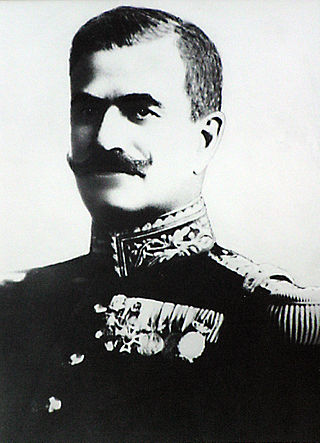| |||||
| Decades: | |||||
|---|---|---|---|---|---|
| See also: | |||||

Events from the year 1928 in Romania. The year was dominated by the Great Depression in Romania. It also saw the first radio transmission in the country.
| |||||
| Decades: | |||||
|---|---|---|---|---|---|
| See also: | |||||

Events from the year 1928 in Romania. The year was dominated by the Great Depression in Romania. It also saw the first radio transmission in the country.

The National Peasants' Party was an agrarian political party in the Kingdom of Romania. It was formed in 1926 through the fusion of the Romanian National Party (PNR), a conservative-regionalist group centred on Transylvania, and the Peasants' Party (PȚ), which had coalesced the left-leaning agrarian movement in the Old Kingdom and Bessarabia. The definitive PNR–PȚ merger came after a decade-long rapprochement, producing a credible contender to the dominant National Liberal Party (PNL). National Peasantists agreed on the concept of a "peasant state", which defended smallholding against state capitalism or state socialism, proposing voluntary cooperative farming as the basis for economic policy. Peasants were seen as the first defence of Romanian nationalism and of the country's monarchic regime, sometimes within a system of social corporatism. Regionally, the party expressed sympathy for Balkan federalism and rallied with the International Agrarian Bureau; internally, it championed administrative decentralization and respect for minority rights, as well as, briefly, republicanism. It remained factionalized on mainly ideological grounds, leading to a series of defections.

Ion Mihalache was a Romanian agrarian politician, the founder and leader of the Peasants' Party (PȚ) and a main figure of its successor, the National Peasants' Party (PNȚ).

Gheorghe G. Mironescu, commonly known as G. G. Mironescu, was a Romanian politician, member of the National Peasants' Party (PNȚ), who served as Prime Minister of Romania for two terms.

Vintilă Ion Constantin Brătianu was a Romanian politician who served as Prime Minister of Romania between 24 November 1927 and 9 November 1928. He and his brothers Ion I. C. Brătianu and Dinu Brătianu were the leaders of the National Liberal Party of Romania, founded by their father, Ion C. Brătianu.
The National Liberal Party–Brătianu was a right-wing political party in Romania, formed as a splinter group from the main liberal faction, the national liberals. For its symbol, PNL-Brătianu chose three vertical bars, placed at equal distance from each other. The Georgists' official voice was Mișcarea, a journal that supported an eponymous publishing house; notably, Mișcarea published art chronicles contributed by the writer Tudor Arghezi.

Constantin Antoniade was a Romanian jurist, writer, historian, philosopher and diplomat of ethnic Greek heritage. As a historian he was a concerned mainly with the Renaissance. He also translated works of John Ruskin and Thomas Carlyle into Romanian.

Nicolae Ionescu was a Romanian politician, jurist and publicist, brother of the agronomist Ion Ionescu de la Brad. He was leader of the Free and Independent Faction, serving several terms in Chamber and Senate, most often as a representative of Roman County, and was helped to establish several liberal coalitions in the 1860s and '70s. His career peaked just before the Romanian War of Independence, when he was Minister of Foreign Affairs in the cabinet of Ion Brătianu. Ionescu ended his career in politics with the National Liberal Party. A professor of world history and a rector of Iași University, he was also one of the founding members of the Romanian Academy.

Constantin A. Crețulescu or Kretzulescu was a Romanian academic, politician, and honorary member of the Romanian Academy from 1871. He served as Prime Minister of Romania and Minister of Justice from 1 March 1867 until 4 August 1867.

Paul Bujor was a Romanian zoologist, physiologist and marine biologist, also noted as a socialist writer and politician. Hailing from rural Covurlui County, he studied biology in France and Switzerland, where he was attracted by left-wing ideas; his evolutionary biology, informed by the work of Carl Vogt, veered into Marxism and irreligion. Returning to the Kingdom of Romania, he was a junior member of the Romanian Social Democratic Workers' Party, active on its moderate wing. He earned the critics' attention in the 1890s as a short story writer with a socialist and pacifist message, but only returned to fiction writing briefly, in the 1930s. An award-winning ichthyologist, Bujor was hired by the University of Iași, where he taught for 41 years, and throughout the period worked on documenting the Black Sea fauna, and made discoveries concerning the environment of Techirghiol Lake. He inaugurated the Romanian study of animal morphology, while also contributing to histology, embryology, and parasitology, and gave popular lectures on evolution and physical culture.
Nicolae N. Săveanu was a Romanian politician and academic.
Constantin D. Dimitriu-Dovlecel was a Romanian lawyer and politician.

Ștefan Cicio Pop was a Romanian politician.

Constantin Iancovescu (1862–1945) was a Romanian politician and general.
Events from the year 1947 in Romania. The year saw the abdication of Michael I of Romania and foundation of the Romanian People's Republic.
Events from the year 1934 in Romania. The year saw the country sign the Balkan Pact.
Events from the year 1935 in Romania. The year saw the foundation of the Romanian Academy of Sciences.
Events from the year 1929 in Romania. The year was dominated by the Great Depression. Romania won on the first Balkan Cup, held this year.
Events from the year 1930 in Romania. The reign of Carol II started during the year, which also saw the foundation of the Iron Guard. The first local election in which women could vote and the only census of Greater Romania were also held during the year.
Events from the year 1922 in Romania. The year saw the Dealul Spirii Trial and the crowning of King Ferdinand.
Events from the year 1881 in Romania. The year saw the end of the United Principalities of Moldavia and Wallachia and the creation of the Kingdom of Romania.